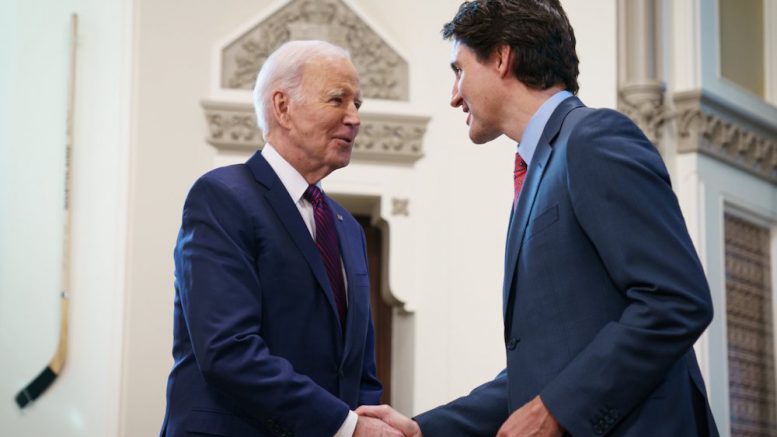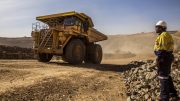It can be easy to take a partnership between Canada and the United States as a given,” U.S. President Joe Biden told the House of Commons on Mar. 24 on his first official visit to Canada.
While he meant this as a positive and went on to describe the peaceful and prosperous relationship is a “marvel,” Canada has been reminded several times in recent years that it can’t — and shouldn’t — expect that U.S. economic policy will automatically favour us, no matter how close and historic the bond.
A few years ago, Biden’s predecessor, former President Donald Trump, made the unexpected and unilateral decision to redraw the carefully crafted North American Free Trade Agreement, resulting in the new U.S.-Mexico-Canada Agreement (USMCA) in 2020.
And just last year, there was a panic over Canada’s initial exclusion from EV incentives in Biden’s landmark Inflation Reduction Act (IRA) — an omission that was only reversed at the last minute after frenzied lobbying by Canada.
But during Biden’s speech and subsequent joint press conference with Prime Minister Justin Trudeau, he offered reassuring words and commitments that the U.S. wants to cooperate with Canada on clean energy, critical minerals security and supply chains, defence, and more.
While at one point, Biden seemed to imply that Canada would get the mining jobs and the U.S. would get manufacturing, most of his speech emphasized that the nations would build the batteries and technologies that go into clean tech like EVs together.
“We each have what the other needs,” he said.
“Our nations are blessed with incredible natural resources. Canada in particular has large quantities of critical minerals that are essential for… the world’s clean energy future,” Biden added.
“I believe we have an incredible opportunity to work together so Canada and the United States can source and supply here in North America everything we need for reliable and resilient supply chains.”
He went on to predict in his joint remarks with Trudeau that in the future, China would be “out of the game, in terms of many of the products they’re producing,” and that the U.S. and Canada would be solidly “economically situated for the future in terms of also bringing back manufacturing jobs.”
During Biden’s visit, the two nations also announced a one-year Energy Transformation Task Force to speed up coordinated efforts to deliver clean energy and integrated supply chains for renewable energy, EVs, critical minerals and more.
And in addition to EV incentives under the IRA, Canadian companies will also be eligible for other U.S. funding under the U.S. Defense Production Act, including a total of US$250 million announced last year toward mining and processing critical minerals (funding recipients will be named in the spring), and a $50-million pool to incentivize investment in the semiconductor sector.
Compete or collaborate?
Biden and Trudeau also disagreed with the perception that the “massive” funding (about US$370 billion over 10 years) the U.S. has earmarked for clean energy spending would hurt Canada.
“The IRA, which is bringing in massive investments and massive opportunities for American workers and companies, is also going to have strong impacts on supply chains and producers and employees in Canada,” Trudeau said in a joint press conference after Biden’s appearance in the House.
Still, the United States’ all-in approach on the energy transition has put pressure on the Trudeau government to beef up its support not just for clean tech, but also for the raw materials needed for the energy transition. Its $3.8-billion critical minerals strategy announced in its 2022 budget last March looks rather anemic compared to U.S. spending, even on a proportional basis.
“We’re going to have to make sure we’re staying competitive and targeting the areas where we think we can best compete,” Trudeau acknowledged at the joint presser, adding, “we’ll have more to say about that in our budget next week.”
The feds are already supporting investment by auto and battery makers such as Volkswagen, which in March chose St. Thomas, Ont., for its first battery plant outside of Europe, Umicore and its plans for a $1.5-billion cathode materials plant near Kingston, Ont., and Stellantis and LG Energy Solution’s $5-billion battery plant near Windsor (although dollar amounts of incentives have not been revealed). They’ve also announced tax credits for exploration for critical minerals. But that still neglects a crucial part of the supply chain — the part that actually supplies the sought-after raw materials.
The 2023 federal budget was just released at press time on Mar. 28, revealing a few highlights for miners.
In response to the IRA, the government has earmarked $21 billion – mostly in tax credits and subsidies — for clean technology, renewable energy and more over next five years. This could grow to $80 billion by 2034.
This includes a clean tech manufacturing tax credit that will be worth $4.5 billion over five years. The 30% tax credit will be available to companies mining and refining critical minerals to offset the cost of equipment.
The government also seems to recognize that incentives alone are not going to get the results they want. That’s why it’s good to see that the budget also establishes a $1.5-billion Critical Minerals Infrastructure Fund, to be managed by Natural Resources Canada, that should help advance priority mining projects by funding energy and transportation infrastructure.
Equally important, it also contains a commitment to improve the efficiency of the impact assessment and permitting processes for major projects by the end of this year, and commits to advancing loans through the Canada Infrastructure Bank to Indigenous communities so they can purchase equity stakes in major projects.






Be the first to comment on "Biden soothes Canada’s fears of being crushed by US clean energy push"